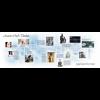Science
No doubt this thread will wither away and die soon enough but I hope to spark some sort of discussion about all things science! I love almost all aspects of science and know there's a few people here who enjoy it too (as well as a few maths geniuses).
My main areas of interest are the Biology/Chemistry interface and I hope to study a related degree next year (either Biochemistry or Biological and Medicinal Chemistry) and am in the process of writing my Personal Statement for my UCAS Application. It's not going well and my school's early entry deadline is in just 12 days!
One particularly interesting piece of research I have enjoyed looking into is DNA Origami. Long strands of DNA have been used to create different 2-D and 3-D shapes, held together by shorter DNA staples. Early shapes (developed around 2006) included flat sheets, cubes, maps of China and America, and even a smiley face! More recently, they have manged to create slightly more useful objects such as a round 'flask' that could potentially hold another substance inside it. The full potential of these objects hasn't exactly been realised, to say the least, but potential applications include enzyme inhibition, specific drug delivery and nanocrystal templates.
Anyone else? 
 Well I've just started sixth from and am studying maths, further maths, chemistry and physics and I'm really enjoying it.
Well I've just started sixth from and am studying maths, further maths, chemistry and physics and I'm really enjoying it.
Good luck with the UCAS application, you sound like you're going to do something very similar to my sister who's doing something medical.
Oddly enough biology is the one science I'm not a huge fan of, it's badly taught at my school, but I read the book 'genome' by Matt Ridley which I found fascinating, although I've never heard of making shapes with DNA before!
One particular thing that I find really interesting is electrons in that they display particle-wave duality (they behave like a particle and a wave, like photons) and I find all the huge/tiny numbers cool. I've only been back at school for just over a week so there's not much hugely interesting stuff looked at so far as we've mainly been revising GCSE stuff, but the syllabus(what's the plural? syllabi? syllabuses?) looks really interesting  .
.
Yeah, I remember discussing science/maths a bit with you before, Will, and you were telling me about your love of maths! 
I know what you mean about the way biology is taught - some of the ecology topics (population, environment, energy transfer etc.) can be mind-numbingly boring. I don't find them particularly interesting anyway but when they are taught using nothing more than keywords, a couple of simple energy equations and a few pyramids of biomass, numbers, energy etc. I just can't see the point. These topics seem to border on geography too much for my liking (no offence to any geography fans). I'm primarily a biochemist; luckily one of my Biology teachers this year has a degree in Biochemistry and is ridiculously passionate about his subject. I much prefer studying the processes in cells, and the molecules that both make them up and can affect them when introduced. I find this complexity, on such a small scale that we can't even see it, absolutely brilliant.
And yes, wave-particle duality is really interesting! There was a big question about the Photoelectric Effect on my AS Unit 2 Physics exam which was great as it allowed me to just explain the whole thing using Einstein's quanta/photon theory and equation, as well as the observations that can be made when using a gold leaf electroscope UV, visible light and a perspex/glass block to prove the effect. I like how this theory holds true for everything, whether coventionally considered a wave or a particle. Electrons are waves, light is matter?! What's going on?! 
An understanding of electron excitation is also really useful in both Chemistry and Biology. It helps make sense of ionsisation energies and the varying electronegativities of different elements (very useful for bonding and chemical mechanisms in Chemistry), and it is also relevant when looking at the complex processes involved in the light-dependent reaction of photosynthesis in Biology.
I think I said it before, Will, but with that combination of complimentary subjects and a passion for science/maths you should do pretty well at A-Level. If you don't mind me asking, how did you do in your GCSEs? No need to say if you don't want to 
I don't like calculating stuff, so I chose to study mathematics.  Physics is really fun as well, but I'm not interested in the solution to an equation. I'm interested in the properties of an equation and want to see if I can find a general solution for equations with that property.
Physics is really fun as well, but I'm not interested in the solution to an equation. I'm interested in the properties of an equation and want to see if I can find a general solution for equations with that property.
Biology was taught really badly and boring at my school, so I dropped that, but I do have some knowledge on the subject out of sheer interest. Genetics and epigenetics are really interesting, as is neurobiology. Especially neurobiology, actually. 
I was good at chemistry, but it wasn't my thing. No general solutions for anything, no real axioms by which you can determine new properties. Also, my teacher was too much of a chemist to understand that a/b=1 means that b/a=1 as well.
Computer science is really awesome as well, but I chose to not limit myself to the restrictions a computer has. I want to be able to change the rules as I see fit. 
Now, I'll just leave this here...

Mostly true, Phi 
And I like your view on mathematics as a set of tools that can be manipulated in different ways to solve all sorts of problems. Often people look at it as lots completely discrete formulae that aren't significantly linked and they just follow the rules they have learnt/been taught. I think if you can see the links between different mathematical ideas you are a true mathematician.
I must admit, maths is not my favourite area but I can see how important it is in science and can't avoid it if I want to study at a higher level. I see it more as a tool that can be applied to real, scientific situations and really enjoy applying it in Physics. I began to dislike maths at GCSE due to being fast-tracked (taking it a year early) and having a really poor teacher. I still managed to get an A but narrowly missed out on an A* and that has always annoyed me. We then spent our last year (when we should have been finishing the GCSE course) doing a Free Standing Maths Qualification. Everyone ignored the exam because we still had proper GCSE exams on the same day and I ended up getting a D. I can't remember much of the content of the FSMQ but I enjoyed it more than any of GCSE and the teacher was brilliant. I was still too put off to take it at A-Level though. If I'm honest, I regret not taking it just a little bit.
If you don't mind me asking, how did you do in your GCSEs? No need to say if you don't want to
I think ecstatic was the right word when I got my GCSE results, I'll leave it at that  . I got brought back down to earth fairly quickly after that, an embarressing incident involving drink followed the day after
. I got brought back down to earth fairly quickly after that, an embarressing incident involving drink followed the day after 
As for A-level I'd like to think I'm fairly well set up. Btw, do teachers at all schools give the 'this is your most important year' lecture at the start of every year or is it just mine? I also have one guy in my maths set who is, honestly, a bit dim, which is frustrating or funny depending on my mood 
We looked at annihilation between matter an anitmatter today, and also rest energy using Einstein's E=mc2 (how do you do it as a proper squared sign on a computer?) both of which were interesting, our teacher also likes talking around the syllabus so we learn lots of cool stuff that we don't need to which I like  . Chemistry was actually a tad dull as they were going through AS notation for electronic structure which I already know about but atleast that meant the homework was easy!
. Chemistry was actually a tad dull as they were going through AS notation for electronic structure which I already know about but atleast that meant the homework was easy!
Haha. I could tell you'd done really well - you're too modest. I was pretty pleased with my AS results too. Yeah, our school was the same with the whole 'this year is really important'. To be honest, it is pretty important but if you found GCSEs relatively straight forward you should be fine and, although it is necessary to do well, you want have to work overly hard to do so. Even so, don't get complacent, especially if you do exams in January as the summer modules tend to be more challenging.
Yeah the AS Levels tend to start off with mostly revision and a few new simple topics. It's good to revisit some of the basic stuff though as the summer has a terrible habit of causing your brain to turn to mush 
I don't think we explore E=mc^2 until this year so that will be cool. What exam boards do you do?
... 8th grade science not much to talk about .... 
Yeah, teachers say that every year: "This year is the most important!"
I think I'm actually in the most important year of my career now, studying mathematics. I have to build up an actual base for what I'll be doing later and if I screw that up...
What are you planning to do with your maths, Phi?
Become a mathematician. 
I want to invent new maths, possibly while being affiliated to a university.
Haha. That much I gathered  I just thought perhaps you might want to go into finance, business etc. (although as you've already said you don't like calculating stuff that didn't seem likely).
I just thought perhaps you might want to go into finance, business etc. (although as you've already said you don't like calculating stuff that didn't seem likely).
Yeah, I think continuing to study/research while affiliated to a university is a great idea. I hope to either carry out R&D as part of an industrial company or work as a reseacher/lecturer at a uni. Either would be fantastic.
I spoke to a Chemistry research leader at the University of York and told her that both of my parents are teachers. I then expressed a wish to steer away from education. She pointed out that most research is available in universites and that research and lecturing often go hand-in-hand. If it's in your genes, it's hard to get away from! I realised that she's probably right and no doubt I'll end up doing at least some form of teaching during my career 
i have no idea what any of you are talking about, i just wanna say that whenever i hear the word "science" i think of comedy.
namely Portal and Dr Insano comes to mind.
Science is always comedy gold.
you may now carry on with you's discussion on graphs and chemicals and whatever it was
Alright, Rob.
Yeah, I figured that I'd be lecturing as well. I've already got some individual teaching experience since I tutor kids, so I suspect that will only add up later on. I don't have much experience with classes, though.
I've done a bit of teaching to a year 7 class. Our school has a Subject Support Programme where Sixth Formers volunteer to help in lower school classes. We wrote down our subjects and were assigned a subject based on them.
With my subjects being Chemistry, Physics, Biology and Religious Studies I expected and hoped to be assigned to a year 7 or 8 science class and ended up in an Religious Education class instead 
It was quite interesting to work with younger kids and see how they reacted to me (being only 5 years older) teaching them. I would definitely have preferred a science class though 
Stuff like that happens Patrick, and it sucks when it does!
The hardest part about teaching is coming up with ways to explain the stuff you're teaching to the kids in a manner they can understand, because for you it might be very logical, but it's not for them.
This is also the reason class approach isn't as effective as individual learning. In a class approach, it's impossible to explain the subject in such a way that everyone understands it equally and fully, because everyone has a different learning style.
Oh well, off to the university! Yay, linear algebra. ^^
Yeah try explaining the Hindu concept of reincarnation to a group of 12 year olds! 
Haha, have fun! 
Hmm. Science, huh? Allow me to inject some of my own experience...
Let me start off by saying that I hated Biology and Chemistry in high school. The subject didn't make any sense. The teachers were lazy and inefficient. The class was loud and obnoxious. How I manage an A is beyond my comprehenions.
On the other hand, I fell in love with Physics during my juinor (honors) and senior year (AP). I love how its so simple: you just plug in variables for an equation associted with the problem (whether it'd be kinematics, vectors, or thermodynamics) and solve for the unknown variable.
Mathematics is a mixed bag for me. AP Calculus was taught to be by a very nice and PATIENT teacher! For some reason, I understand calculus more better than algebra. Weird...
Physics is much more than just plugging variables into equations, you know. 
It hasn't got the elegance and absolute freedom mathematics has, but it's the next best thing. 
I think Physics is great because it applies Mathematics to real-life ideas and there is also plenty of text-based information to learn, as opposed to equations and numbers all the time 
Maths is brilliant for exploring logic and pushing the limits of how the world works (Maths and Philosophy can be remarkably similar), but I find Physics easier and more enjoyable as it applies these rules to everyday situations. I suppose my mind is not abstract enough really 
I'm not allowed to solve equations in my Calculus homework, Patrick. Mathematics isn't about formulas and equations and all that crap they teach you in high school.
There were only a few things in HS I got that came close to real mathematics: Euclidean Geometry and the ABC-formula (a general solution to a set of equations with certain properties). Do note that we never put numbers in it, since we've solved every equation of the form ax^2+bx+c already, so we consider it a useless exercise.
As PartrickDeneny put it, physics does apply mathematics to real-life ideas. Or course, you'll never try out the experiments out yourself, but its informative to know how things work and operate in this world.
In my highschool, I was merely taught a bunch of equations and what problems they were associated with. They usually gave all the necessary variables I needed to kind the unknown one. Perhaps its different in college.
Yeah I realise pure maths is much more than just equations but I just find real world concepts far more stimulating, especially if they're linked to current research and development (which is what I want to go into).
Without the pure, abstract maths none of this applied understanding would work, of course. I think the very core of maths (the stuff I should imagine you are studying, Phi) pretty much explains the whole world on a fundamental level. Each tier of science gets further from this core and moves away from pure theoretical logic into an explanation of matter, energy, life etc.
Interesting how there's a science thread yet no talk of the speed of light possibly being broken...
Interesting how there's a science thread yet no talk of the speed of light possibly being broken...
I was just going to talk about that!!!!
Awwww..... who am I kidding? I wasn't going to talk about that. 
This was discussed briefly at a Uni talk I went to in Cambridge but I never really thought to bring it up here - we got a bit caught up in general science! If it is indeed true and can be repeated, the breaking of the speed of light is remarkable 
It hasn't actually been confirmed, though the measurements were supposed to be really accurate. There is a chance that there have been measurement errors and the like. Also, neutrinos are very hard to register. Right now, billions of neutrinos are flying through you and the earth, just to come out on the other side without engaging in any reacting. Only a few of the neutrinos actually made in Genève reach the lab in Italy. The devil is in the details here, since we're talking about a difference of 60 nanoseconds.
Systematic errors seems a very likely possibility so the team are hoping the findings can be confirmed/accepted by other researchers before they claim anything. They have to be very careful before claiming that an idea, central to fundamental physics, is actually false.
Well, it could hold true, but for that we'd have to mess around, like giving neutrinos a complex mass (ie. involving the square root of -1), or adding extra dimensions.
How on earth (or in the rest of the Universe, for that matter) do you go about solving the square root of -1?! 
Imaginary numbers are used for finding the square roots of negative numbers. The letter "i" represents the negative square root of -1, "2i" represents -1 (because it's essentially the negative square root of -1 multiplied by itself), "3i" represents the square root of -1 (because the negative from "2i" cancels out the negative in "i"), and "4i" represents +1 (because everything ends up canceling each other out on this last multiplication). After "4i," the imaginary numbers just repeat themselves because "4i"="1," so "5i"="i," "6i"="2i," etc.
Does that make any sense?
Very well explained but still really confusing 
Imaginary numbers are used for finding the square roots of negative numbers. The letter "i" represents the negative square root of -1, "2i" represents -1 (because it's essentially the negative square root of -1 multiplied by itself), "3i" represents the square root of -1 (because the negative from "2i" cancels out the negative in "i"), and "4i" represents +1 (because everything ends up canceling each other out on this last multiplication). After "4i," the imaginary numbers just repeat themselves because "4i"="1," so "5i"="i," "6i"="2i," etc.Does that make any sense?
Dude, 4i means 4*sqrt(-1). i^4 = i^2 * i^2 = -1 * -1 = 1.
The basic idea behind imaginary numbers is that you give the square root of -1 a name (i) and then continue with the normal rules for arithmetic.
It allows you to solve polynomial equations more easily.
Yep, you've lost me. I do find stuff like this really interesting though, despite understanding very little of it.
Also, FLaE said 4i was 1, he just didn't explain it in the same way as you did:
"4i" represents +1
Its called the Complex Number system, ZI think you can use it on an axis with real numbers as well. I dont know much about it but my linear algebra book has an appendix saying a little about it. I think there are actually 4 number systems or something like that.
I have actually just changed my degree from BCom to BSci at the University of Auckland. I am majoring in maths and maybe statistics as well, although I have no idea what I will do afterwards. At least im enjoying study now though, commerce was just horrible for me. I am still in Stage 1 for maths, and im trying out an applied maths course and a more general maths course ( stuff like calculus and Linear Algebra, which is nice and fresh for me)
I was interested in Science, but high school kinda turned me away. They taught us stuff like erosion, how a volcano works, tbh it all seemed so trivial and boring. I had more fun throwing pencils and screaming with friends, just being ridiculously immature. I dont even regret it either. I didnt study maths in my later years in high school, and I went into uni taking Maths 108 ( the first calculus paper at NZ) and got a B, even though I got letters from uni telling me it would be to hard for me without prior experience.
I think I have similar views with PHI, I am actually pretty good at this applied mathematics course, and it will probably be more relevant and will help me get a job. However the general maths stuff is more interesting. I also don't like DOING maths, I like studying it and learning new ideas. At the end of the day the numbers are all just symbols, the ideas behind the equations is where the beauty lies. I am now finding myself re-learning most of the ideas taught at high school, even stuff like basic algebra.
There are, in general, four types of numbers:
Natural numbers, denoted by N. These are all positive whole numbers including 0, so {0,1,2,3,4,5,6,7,8,...}.
Whole numbers, denoted by Z. There are all whole numbers, so {...,-2,-1,0,1,2,...}. You can construct these from N.
Rational numbers, denoted by Q. These are all numbers of the form a/b, where a and b are in Z, so for {...2,9/4,5/3,...}. You can construct these from Z.
Real numbers, denoted by R. These are all numbers that lay on the number line, which stretches out from -infinity to infinity. It includes numbers like the square root of 2 (which can't be written in the form a/b and thus isn't in the rational numbers) and pi.
Complex numbers, denoted by C. It turns out that when working in R, the square root of -1 has no solution. By just giving the solution to that a new name (i), we can use the rules we got from R to start working with those solutions (which is handy for a specific type of equation). All complex numbers are of the form a+bi, where a and b are in R.
To give you an idea of how these numbers work, let's multiply the following complex numbers: (1+2i)*(1-2i).
As you may now, this is a special product of the form (a+b)*(a-b)=a^2-b^2. We then get the following:
(1+2i)*(1-2i) = 1^2 - (2i)^2
(1+2i)*(1-2i) = 1 - 2^2*i^2
(1+2i)*(1-2i) = 1-4*(i^2)
Now, because sqrt(-1)=i, i^2 = -1. So:
(1+2i)*(1-2i) = 1-4*(-1)
(1+2i)*(1-2i) = 1+4
(1+2i)*(1-2i) = 5
So when working with numbers that don't "exist" (you can't visualize a square with area -1, so visualizing the side would be a bit hard, no?  ), we can get to numbers that do "exist" (you can visualize). This has been the trick to many great discoveries in mathematics.
), we can get to numbers that do "exist" (you can visualize). This has been the trick to many great discoveries in mathematics.
There are also number systems expanding C even further, like Quaternions, but those don't seem to be having the usual properties the other systems have, like commutativity (a+b=b+a for all a and b).
Mathematics is so much more than just numbers, though. You now the Rubik's cube, right? We can classify that using Group Theory, which is a really interesting branch of mathematics, since you have much more freedom than working with numbers. It allows you to produce algorithms to solve the cube and also calculate how many different states a cube has.
I was just thinking about your earlier picture, with the math guy being at the top. Mine is similar, only the philosopher is like miles ahead of the math guy. Then there is another guy who isnt even on that plane who is just stoned.
Haha. I was sitting in Philosophy the other day thinking how it was superior to science in many ways (although the way my teacher teaches it it's terrible).
The stoned guy is just chilling with Plato in the World of the Forms 
And the bartender says, "We don't serve faster-than-light particles in here!"
A neutrino walks into a bar...

Makes me wonder, if we had an animus we wouldn't really bother with trivial stuff like Ezio and Altair. Why not push the idea to the max and delve into the memories of the very first humans on earth and see the world from their perspective.
Nice thought, Jack. I wonder how preserved those ancients humans' memories would be? Not that they really exist in DNA anyway 
how far would it be able to stretch it though? where woukd the limit be?
neanderthals? amoebas?
Right to the beginning of time! If there is such a thing.
Anyway I have to take 2 general education classes for my degree, and I devided to take an astronomy/physics class for fun. I have been kinda interested in cosmology now, such as theories like the Big Crunch and other ideas of how the universe will end. Also I always imagined that the visible universe that we know is just a dot surrounded by thousands of other dots...
I also got interested in multiverse, as in multiple space-time grids with different physical constants. Every type of combination of universe exits and this is just one of them. There is a thin line that distinguishes cosmology and just sheer stoner talk...
Multiverse theory is both brilliant and terrifying.
i always wonderd what a universe would be like if they had the same tech we have now in the 1400's. most likely WAAAAAAAAAAAAAAAAY more advanced than us
Well, since our universe had the Dark Ages (setting us back...100 years in technology/science?) we're behind where we should be. So imagine during World War 1. They should've had things like iPhones and IMAX films. That's how it is in another universe. I love this theory, because anything you think of has the possibility of existing. The Assassins are real somewhere.
And expanding that idea makes things even crazier. Not only everything you can think of is possible, but everything that is possible to think about is possible, and maybe even probably if the universe is infinite.
In most of the other dimensions, Assassin's Creed and THB don't exist. In fact, technology as we know it doesn't exist. Mind you, these multiverses probably don't exist anyway 
I submitted my application for university today so here's hoping I get some interviews/offers and that this time next year I'll be an undergraduate studying for a science-based degree 
I've also managed to secure some work experience in a lab for a few days, thanks to my uncle - can't wait! 










